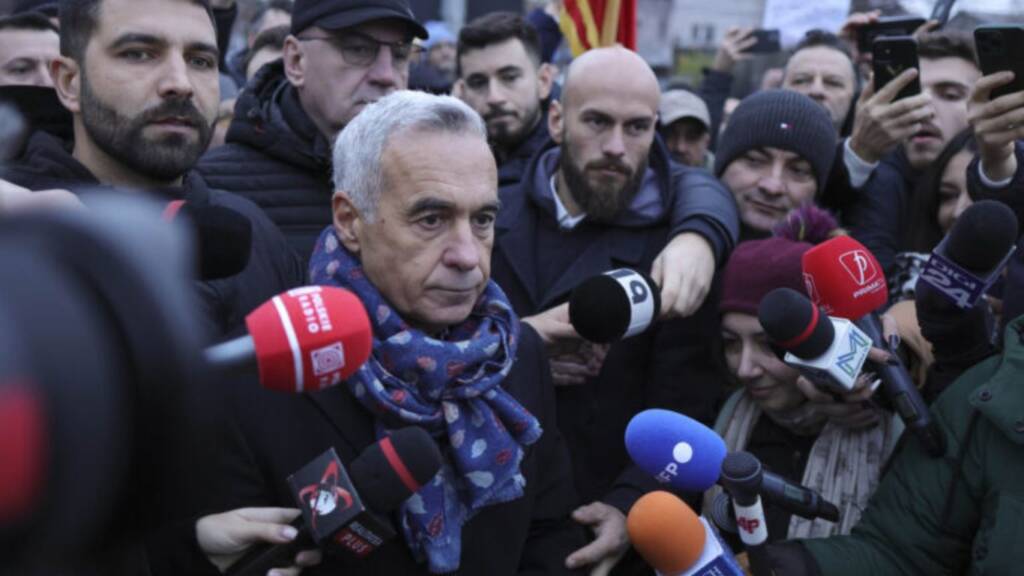Bucharest’s political establishment just showed its true colors in spectacular fashion. Calin Georgescu, who clinched victory in the first round of presidential elections, is being denied his democratic right. He has been blocked from a second-round win after convenient claims of “Russian interference.”
Romania’s streets are boiling with rage as citizens express their mounting frustration with EU and NATO influence. The latest wave of protests saw Alliance for the Unification of Romanians (AUR) supporters flooding Bucharest, demanding justice for their stolen election.
AUR leader George Simion didn’t mince words, “We continue to protest because the usurper president and the traitorous government refuse to listen to the people! They have not given us any answers, they have not taken any measures!”
Court Cancels Romania Elections
Călin Georgescu, an independent candidate labeled “far-right” and “pro-Russian” by his opponents, shocked the establishment by winning the first round on November 24th. The system’s response was swift – Romania’s Constitutional Court simply annulled the first round and ordered a complete rerun, effectively blocking the scheduled run-off.
Nearly 1,000 demonstrators turned Bucharest into a symphony of protest – vuvuzelas blaring, drums beating, and Romanian flags waving in defiance. Their chants echoed through the streets: “Down with the government!”, “We want the second round back!”, and “We don’t want to be led by thieves!” Their banners told the story just as clearly: “Democracy!”, “Down with censorship!”, and “Down with dictatorship!”
This follows an even larger demonstration just a week earlier, where over 100,000 Romanians gathered to support Georgescu’s victory. The message is clear: Romanians are fighting back against what they see as blatant election interference, and their patience with both EU and NATO oversight is wearing dangerously thin.
This all started as Romania’s Supreme Court initially laughed off these interference allegations, but suddenly had a change of heart under mysterious “external pressure.” Resulting in a complete election cancellation – even as second-round voting was already underway, thousands of diaspora voters were left high and dry.
Western media, EU leaders and even Brussels maintained a conspicuous silence or engaged in systematic character assassination of Georgescu. It was notably an American podcaster, who provided the first substantial platform for Georgescu to articulate his positions without prejudice. As of now, Georgescu is out of the race due to his purported ‘ties to Russia’.
Demeaning Silence of EU
Georgescu’s primary political transgression appears to be his unwavering commitment to Romanian national interests. He categorically dismissed allegations of being pro-Russian, instead emphasizing his “pro-Romanian” stance – a position that evidently unsettles the established political order.
His systematic critique of NATO’s transformation from a defensive alliance into what he characterizes as an offensive military bloc, coupled with his questioning of Romania’s involvement in the Ukraine conflict, particularly agitated political establishments both domestically and internationally.
In his political philosophy, Georgescu aligns with other European leaders like Hungary’s Viktor Orbán, who have consistently challenged prevailing globalist narratives.
His perspective on NATO membership is rooted in pragmatic nationalism – asserting that sovereign nations must retain the right to reevaluate their international alignments based on contemporary national interests rather than historical commitments or external pressures.
Also Read: Croatian President Zoran Milanović delivers a big shock to EU
The institutional response to Georgescu’s rising popularity has exposed fundamental contradictions within self-proclaimed liberal democracies when confronted with genuine opposition.
Utilizing constitutional provisions as a legal instrument, the Court’s decision to nullify election results and indefinitely postpone new elections sends an unambiguous message to nationalist leaders in nations under external influence: deviation from approved political narratives carries severe consequences.
The Georgescu electoral crisis transcends mere Romanian domestic politics – it serves as a comprehensive demonstration of how established political systems respond to figures who prioritize national sovereignty over international obligations. This episode starkly illustrates that democratic processes are tolerated only insofar as they produce outcomes acceptable to prevailing global power chambers.
